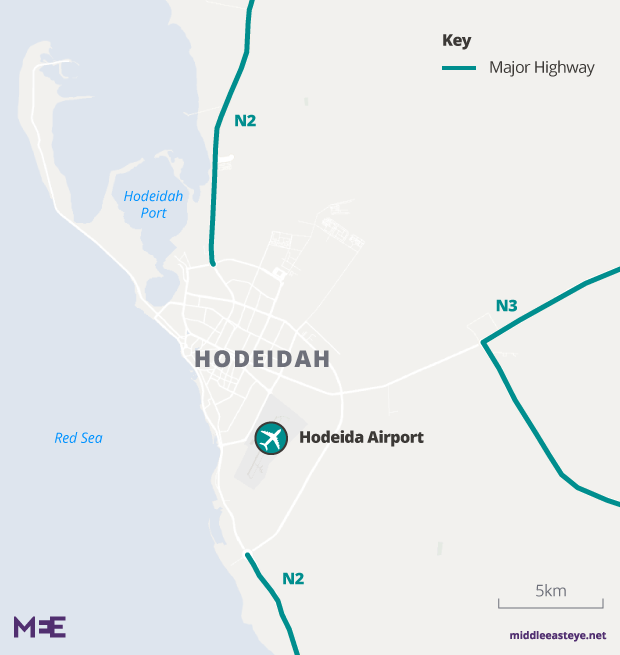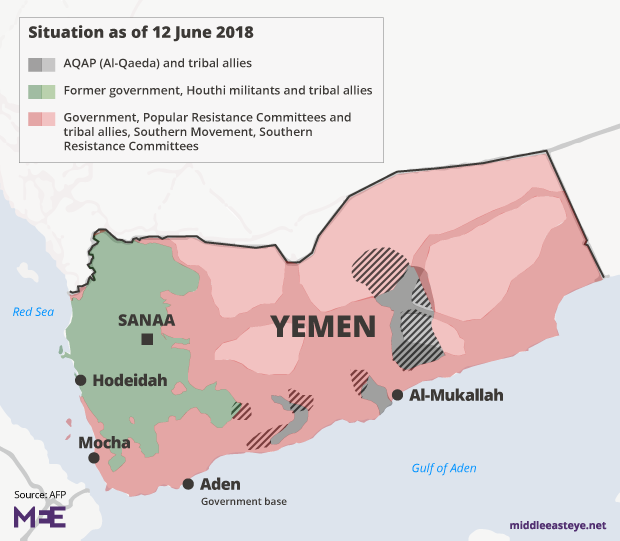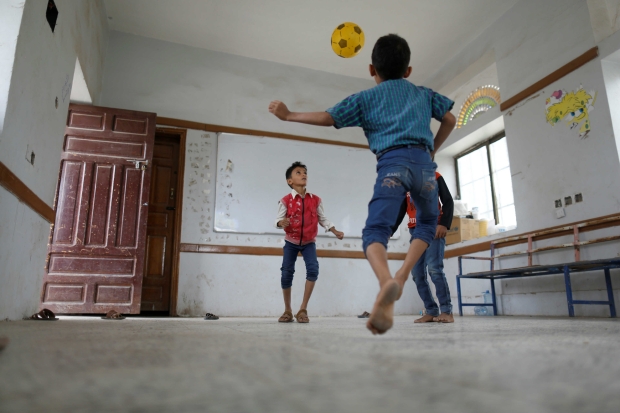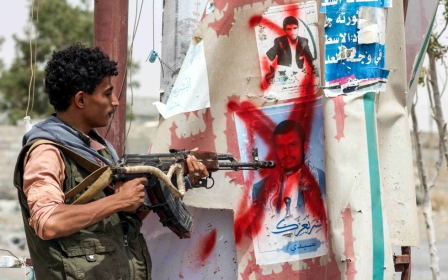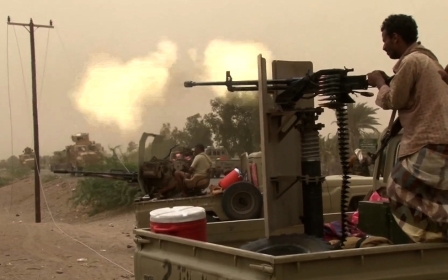Yemenis in Hodeidah cool under pressure, despite approaching storm
TAIZ, Yemen - The sounds of air strikes, explosions and artillery have moved closer and closer towards Hodeidah city in recent days.
Residents of Hodeidah’s outskirts, which have witnessed intense battles as pro-Yemeni government forces close in, have already fled their houses towards the city and other provinces.
In the city itself, however, most residents have not yet fled, choosing to stay put in the belief that the war is still far from their city.
Abdul Hakim Ahmed, a resident of Shamsan Street in central Hodeidah city, told Middle East Eye that the sounds of the battles have been heard there for more than a week.
He said residents have prepared themselves to flee at any moment, but they are not sure that the war will target the city, so they have not yet fled.
"I am working in a lumber shop and if I do not work I will not get money,” Ahmed said.
“So I have put my valuables in bags and if the war targets the city, I will immediately flee towards Sanaa."
"Regular life is going on normally in the city and people buy wood as usual,” he added.
“So I can say that the battles in the outskirts of Hodeidah have not affected the city so much yet."
Progress slowed
The assault on Hodeidah, which is being carried out by a collection of Yemeni ground forces backed by foreign mercenaries, Emirati troops and Saudi and UAE warplanes, helicopters and battleships, has made some progress since being announced on 13 June.
The Red Sea city is defended by Houthi rebels, who MEE reported are digging trenches, setting up roadblocks and placing snipers’ nests in tall buildings in anticipation of street-to-street fighting.
Landmines have been scattered across the city’s outskirts, dangerous obstacles for civilians attempting to flee.
Last Wednesday, the pro-government coalition took Hodeidah’s airport from the Houthi rebels defending the city.
According to Ahmed, since then Hodeidah’s residents have seen no evidence that the battle is rapidly approaching, assuaging their worries for now."Two weeks ago, the residents were very concerned about the battles. But today they are not as worried as before, because they have noticed that the war is moving slowly and there is no danger to residents," he said.
The Yemeni forces fighting for President Abd Rabbuh Mansour Hadi and the Saudi-led coalition backing them have said that landmines and Houthi snipers are the main reasons behind the slowing advance.
And thanks to the holdup, life inside the city runs at a normal pace, with shops and markets open, offering business as usual.
Gangs of thieves
For Hodeidah resident Mazen al-Qershi, 37, the real worry isn’t the fighting. He said he feels no fear, even with the sounds of war edging closer.
"Not all houses are caught up in battles. Usually airstrikes destroy some of them, so I prepared the basement of our building to live inside it if the fighting arrives at our neighbourhood," Qershi told MEE.
Instead, Qershi fears gangs of thieves that he says are bound to spring up as people flee the city and security breaks down.
"The thieves exploit the battles to maraud empty houses and steal everything, even the windows and doors,” he said. “So I will not leave my house even if the battles arrive."
When the pro-Hadi forces backed by the Saudi-led coalition liberated Aden and parts of Taiz city, thieves looted many houses and stole everything, so people like Qershi are cautious about the same happening in Hodeidah.
“I will fight to protect my house from thieves if needed," he said.
Some people, like Qershi, prefer to protect their houses. Others, like Ahmed, intend to flee when the war arrives to their neighborhood. But some have already fled the city towards other provinces.
Basheer Asbahi, 54, wasn’t prepared to wait for the assault to attack his city, so he took all his valuables in his car and fled Hodeidah last week towards Sanaa.
'If the battles will not kill us, the thieves will kill us to loot our houses, so I preferred to flee'
- Basheer Asbahi, displaced Hodeidah resident
"If the battles will not kill us, the thieves will kill us to loot our houses, so I preferred to flee," Asbahi, who used to work in Hodeidah’s port, told MEE.
"I rent an apartment in Hodeidah and I do not have a house, so there is nothing to protect in the city, and my work already stopped more than two years ago."
Staying put
In August 2016, pro-Hadi forces broke the siege of Taiz city from the southwest, shortly after taking several areas in Sanaa province to the north.
Since that time, however, progress has been slow.
Mohammed Ali, a freelance journalist who follows the situation in Yemen, said no one can predict whether pro-Hadi forces will enter Hodeidah city in the coming days, adding that they may stop around the newly taken airport.
“For three years we heard about advances on several fronts, but then the forces paused before the cities,” he told MEE, pointing to Medi in Hajjah province and Sanaa province’s Nihm district, which the coalition has refrained from storming despite approaching them.
However, pro-Hadi forces told MEE previously that they have drawn up a military plan to take Hodeidah and they will not stop their advance until they recapture the city from the Houthis.Ali agrees with the decision to stay put that the majority of Hodeidah’s residents have made.
"The residents of Hodeidah are behaving in the right way,” he said.
“They are living their regular lives normally until they feel the battles are near to their houses, and I hope this will not happen."
According to Ali, the pro-Hadi forces’ advance to the airport is not clear evidence that they can liberate the city, and that is why he is against an exodus from the city now.
Sanaa support
Not everyone is so relaxed.
In Sanaa, initiatives have been set up to help transport people from Hodeidah to the Yemeni capital free of charge. Many bus drivers are also offering the service for those unable to pay.
Ahead of the assault’s launch, Suze van Meegan, protection and advocacy adviser at the Norwegian Refugee Council, told MEE aid agencies worried the poorest could end up trapped in the city.
“Many will struggle to pay for the cost of transport to safety and have too little money to buy enough food,” she said.
Mohammed al-Tayar, an activist in Sanaa trying to help the displaced coming from Hodeidah, said the initiatives are doing their best to make preparations to help as many people fleeing the embattled city as possible.
"There are some organisations and philanthropists that have supported us with money to pay for the transportation of displaced people, while others rent houses for them," Tayar told MEE.
Sanaa’s education department is also coordinating with the initiatives to provide access to some of the city’s schools for displaced children.
"Most of the displaced are needy people and they cannot pay for transportation of a whole family, so this is a priority for us and then we will try to help more."
The activist does not advise people to flee their homes if the battles have not approached yet because it leaves them vulnerable to looting.
If the war arrives to the city, I will flee towards Sanaa, where there are some philanthropists and associations that receive displaced people and help them
- Abdul Hakim Ahmed, Hodeidah resident
"We expect more displaced people will leave Hodeidah in the coming days, but for now we do not advise people to leave their houses if the battles have not arrived yet," Tayar said.
But with news spreading of the measures being taken in Sanaa to receive those fleeing Hodeidah, more of the Red Sea city’s residents will see leaving as their best option.
Ahmed, the Hodeidah resident, certainly sees the draw with Operation Golden Victory closing in: "If the war arrives to the city, I will flee towards Sanaa, where there are some philanthropists and associations that receive displaced people and help them."
With additional reporting from Hodeidah
Middle East Eye propose une couverture et une analyse indépendantes et incomparables du Moyen-Orient, de l’Afrique du Nord et d’autres régions du monde. Pour en savoir plus sur la reprise de ce contenu et les frais qui s’appliquent, veuillez remplir ce formulaire [en anglais]. Pour en savoir plus sur MEE, cliquez ici [en anglais].


